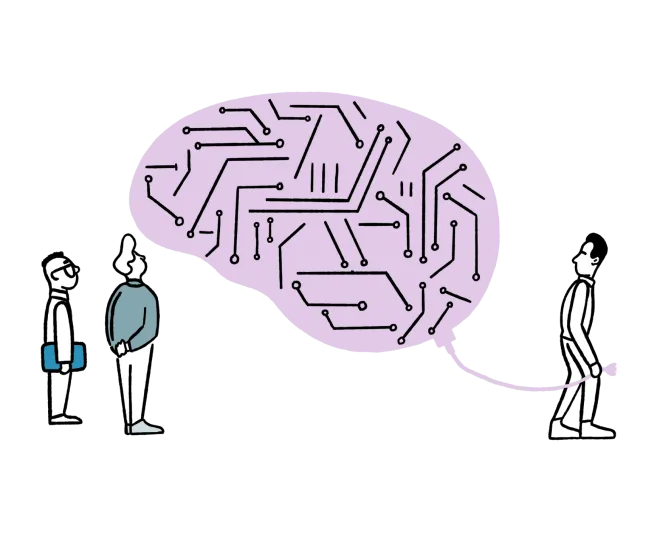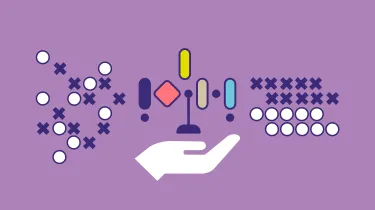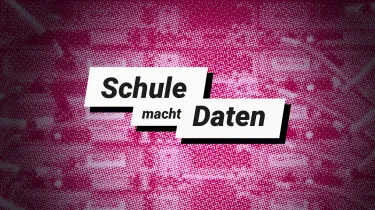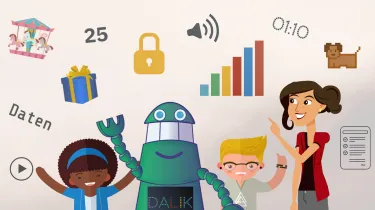Data Literacy
Data competences are a key qualification in the digital age. Being able to understand, critically question, and use data meaningfully prepares people for social, professional, and technological challenges.
Data literacy - the confident use of data - is now a key part of general education and essential for responsibly using and shaping data-driven technologies such as artificial intelligence.
On the AI Campus, you’ll find answers to four central questions: What do I want to do with data? What can I do with data? What am I allowed to do with data? And what should I do with data?


Katharina Schüller studied psychology at the Technical University of Dresden and then earned a degree in statistics at the Ludwig Maximilian University of Munich. In 2003, while still a student, she founded STAT-UP Statistical Consulting & Data Science Services, which she has headed as CEO ever since. The company supports decision-makers in companies as well as politics and administration in building data strategies and data competence as well as developing data applications and models to make data-based decisions with the help of statistics, artificial intelligence and machine learning.
Schüller developed risk modelling software for the Federal Institute for Risk Assessment. This is the prototype of a programme that supports the risk assessor in creating and documenting quantitative risk models.
In 2020, it initiated the development of a Data Literacy Charter under the sponsorship of the Donors' Association for the Promotion of Sciences and Humanities in Germany, which was signed by more than 100 representatives from business, politics and science. In 2021, the IEEE Standards Association appointed her to lead an international working group to develop a global standard for Data & AI Literacy.
Schüller was also involved in the development of the app Stadt, Land, DatenFluss by the German Adult Education Association. This was created to strengthen citizens' data literacy by explaining how new data-based technologies work in a playful way.

Katharina Bata is a mathematician and works as a research assistant at the TH Köln. In her doctoral project, she is investigating the teaching and learning of data science and machine learning methods for engineering students.

Julian studied Mathematics at the University of Augsburg and is currently pursuing a Master’s Degree in Epidemiology at Ludwig-Maximilians-Universität München. He started as an intern in January 2021 and has continued working for STAT-UP as a working student. Before he came to STAT-UP, he worked as a tutor and teaching assistant, and also volunteered as a content creator for an online learning platform.

Hans Alberg has 40 years of experience as an engineer at Alfa-Laval and Ericsson in various positions, for example in reliability analysis and teletraffic theory. During his career he had extensive contact with the academic world. He has been a board member of the Swedish Statistical Society since 2015.

Angela Schmitz is Professor of Mathematics at the Faculty of Process Engineering, Energy and Mechanical Systems at TH Köln - University of Applied Sciences. She teaches mathematics, including in the context of data literacy and numerics, and conducts research on issues of mathematics education.

Dr. Susanne Podworny is a research associate in the Didactics of Mathematics working group at the Faculty of Electrical Engineering, Computer Science and Mathematics at the University of Paderborn.

Yannik Fleischer is a research assistant in the Didactics of Mathematics working group at the Faculty of Electrical Engineering, Computer Science and Mathematics at the University of Paderborn.

I am a personality psychologist by training and my work covers a broad range of topics, including the effects of birth order, age patterns in personality, and the correlates and determinants of subjective well-being. My methodological interests include causal inference on the basis of observational data and data analytic flexibility. I am an active advocate for increased research transparency and have frequently given talks on the topic.
I received my doctoral degree as a fellow of the International Max Planck Research School on the Life Course in 2019 and now work at the Wilhelm Wundt Institute for Psychology, Leipzig University.

Between 1997 and 2002, Karsten Lübke studied statistics at the University of Dortmund. From 2002 to 2005 he was a research assistant at the Department of Statistics at the University of Dortmund and a member of the Collaborative Research Centre "Complexity Reduction in Multivariate Data Structures". From 2005 to 2009 he worked as a data mining analyst in Essen. In 2006 he received his doctorate (Dr. ret.nat.) and was appointed professor at the FOM in 2009. Among other things, he is co-author of the R package klaR and author of various specialist publications on topics of applied and computer-intensive statistics.










